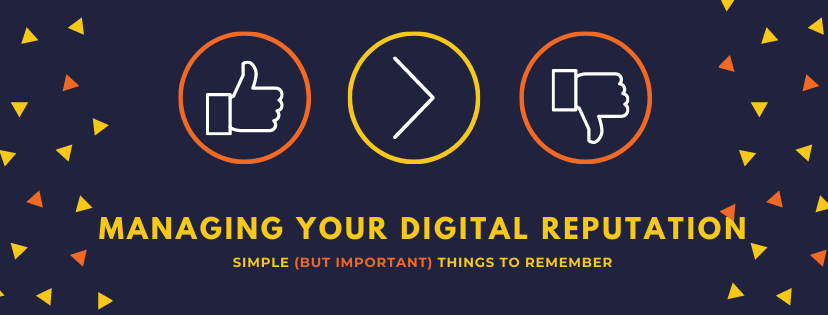
You can’t be all things to all people, but you can start with doing what’s best for your clients and employees. Create positive interactions with your brand, even when it's hard, and positive chatter will naturally follow. It’s not giving in, it’s not being weak, it’s being passionately intelligent.
Once upon a time, not so long ago, we lived in a world where phones were only used to talk on, when someone was mad, dissatisfied, or raging, it wasn’t possible for the entire world to read about it in less than 10 seconds, and bottom-lines weren't directly impacted by someone’s ability to troll your brand hidden behind a smart device. Today, first impressions are created before stepping foot into a building, making a purchase, or even applying for a job. People always talk, especially pertaining to personal experiences. There's a good chance, even if your brand doesn’t have a social media account, your name has been mentioned at some point in browsing history. Why does this matter? Reputation management has evolved into a three-dimensional realm and your customer service now reaches further than your zip code. Your reputation is your brand and your brand is as strong as what people say behind closed doors. You’ve been granted full access to closed-door conversations, thanks to our friends at Google, Facebook and Twitter. These crystal ball-ish resources share solicited (and unsolicited) insight into customer’s thoughts and employee’s feelings. Should you accept the challenge, your brand will reap the benefits.
If I told you, 4 in 10 customers will interact with your brand through your website, apps, social media, and/or Google and 60% of eCommerce customers use customer service reviews as purchasing decisions, would your digital reputation pull through and help your bottom line thrive or nosedive? If you prioritize doing the right thing for your customers and employees, the digital and non-digital conversations you're hoping for will naturally follow. With that, here are the simple (but important) things to remember when managing your brand’s digital, err.. I mean, reputation. You know they’re the same thing, right?
1. R-E-S-P-E-C-T. Respect is earned & hard to regain.
Warren Buffett once said, “It takes 20 years to build a reputation and five minutes to ruin it. If you think about that, you’ll do things differently.” To give respect is to earn respect, so empower (and train) your employees to communicate in a cohesive and purposeful way, so you’re not sailing your reputation-ship solo.
2. Don’t Take the Bait. Do your reputation and future self a favor, don’t face plant.
Showing negativity or aggression, can quickly damage your digital reputation, also known as “face planting.” Treat social channels as first impressions into your brand’s reputation. This is just as important for customers as it is for future employees.
3. Golden Rule. Treat others the way you’d like to be treated.
Imagine visiting a store for the first time and your only interaction with their staff left your question unanswered or worse, completely ignored. Would you recommend that store to any of your friends? Would you leave wanting your customers to feel the same way? Probably not. Treat others the way you’d like to be treated. Apply the same rule to the eCommerce / world-wide-web of inter-social-things, also known as Facebook, Twitter and Google. Why? You guessed it, they’re all driving factors of your digital reputation and directly impact your bottom-line.
4. Be Social. Social media is intended to be just that, social.
Drive the type of conversation you want people to stop their scroll and engage with. If someone takes the time to comment, ask a question, or send a message, respond. Respond in a way that's consistent with your brand, addresses any issues at hand, and has a friendly and approachable tone.
5. Please Hold. But don’t keep me waiting, especially when I’m here to complain.
If you’re not sure what to say, even a simple “thanks for reaching out, we're currently looking into this and will get back with you as soon as possible” is better than crickets. Also, don’t open messages unless you’re prepared to give some sort of response. Most people can see when you’ve opened their message and your indicator of a new message will also be triggered. If you don't respond, it will be interpreted as being ignored, also not good.
6. Shift your Mindset. This is hard, but you can do hard things.
Criticism at it's best and worst feels like a personal attack. It's not. When you approach even the harshest critics with an attitude of gratitude, your mind automatically removes the fight/flight response. Believe me when I say, your tone will be reflected in the way you choose to respond. It’s not an easy shift but can certainly be rewarding. Take the opportunity to be earn respect using your “crystal ball” to pivot and improve.
7. No Fake News. And please don’t try to artificially inflate your brand’s reputation through falsified reviews and fake accounts.
You can’t and won’t be all things to all people. You can, however, do what’s best for your clients and employees. If you create positive conversation, people will naturally reciprocate and will reflect with online reviews, recommendations, and comments.
8. Keep your Glass Half Full. People complain more, are harsher, more aggressive, and downright rude online; I get it. Those people will always exist.
One negative review can trigger your “ONTD” response. Don’t let it. Slow your roll, take a deep breath, and run your response by a trusted/neutral third party before you hit “post”, “respond”, or “send.” It’s not a sign of weakness, it’s a sign of passionate intelligence.
9. Want to be the Best? Just Ask. Not Jeeves, though.
[Insert Flashback to 1997: Ask Jeeves, Print Shop Deluxe, Netscape, Windows 95, Giga Pets, Chumbawamba, Nintendo 64, Palm Pilots, MP3s, & Free AOL -You’ve Got Mail- E-Mail.]
According to Google, mobile searches for “best” has grown 80% over the last few years. Logic says, if you’re wanting to show up as the best option, just ask. If you’re doing the right thing for your customers and employees, this tip shouldn’t hurt your digital reputation, right? Take advantage of the natural momentum and give your audience confidence in their buying decision by encouraging customers and employees to share their experience with your brand or products using text, email, your website, social media, or printed on receipts / invoices. Data also shows 84% of consumers trust online reviews, just as much as personal recommendations.
10. Don’t Worry. Be Happy. At JH Specialty, we live, breathe, eat and work in the digital realm. We've got a pulse on the latest and greatest digital technology and social trends.
2020 taught us lots of life lessons, it also impacted the way we work, eat, shop, interact, learn, and do business. The key to managing your digital reputation is to never stop. I don’t mean setting your alarm for 1 and 3 and 5am; just keep up on the upkeep. Make a conscious effort to invest in your customers and employees and continue to treat others the way you’d like to be treated.
If you’re not wanting to tackle your digital reputation alone, schedule a call with one of our account managers. We welcome the opportunity to discuss the functional and emotional benefits of partnering with JH Specialty for your digital needs.





